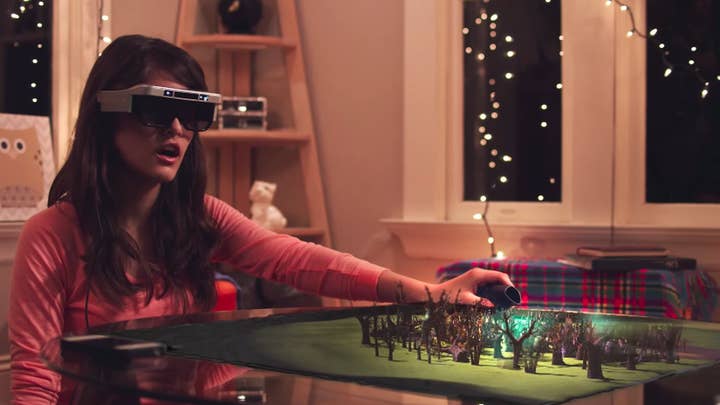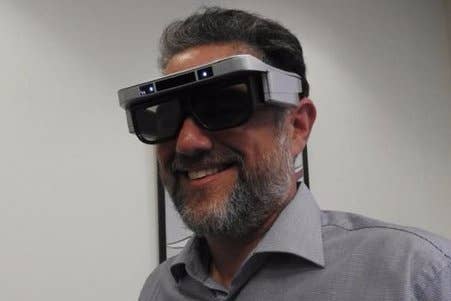CastAR to pay back Kickstarter backers
"We want to do right by our backers and think that this is the right way to do that"
CastAR, the team hoping to lead the way in augmented reality gaming, is doing its best Santa Claus impression this holiday season. Today it's announcing its commitment to pay back its Kickstarter hardware backers, while still offering them a consumer unit.
Back in October 2013 3,863 backers pledged $1,052,110 in support of the projected augmented reality system. Just over a year later and CastAR is forging ahead and wants to refund any Kickstarter backer that pledged to receive a CastAR system.
We spoke to CEO David Henkel-Wallace about the scheme that will please backers and no doubt turn heads and headsets in the industry.
We're giving every backer who was expecting CastAR hardware a free consumer CastAR system at release and will be fully reimbursing their Kickstarter backings. We will start reimbursement via Paypal at the start of the new year with the last batch going out on February 29.
"Just because you can do something doesn't mean it's right"
We're offering reimbursements to backers who pledged at the hardware tiers - “The Magic Wand” and above. The exception is the Early and Almost as Early CastAR backers, since those backers have already received their Early CastAR prototypes. That said, we'll happily exchange any Early CastAR prototypes for a discount code good for one free consumer CastAR at product launch, if any Early/Almost as Early backers would rather wait for the consumer CastAR and content.
A standard Kickstarter Survey will go to all backers this week to collect the necessary info.
Just because you can do something doesn't mean it's right. We have several reasons why we felt it was best to draw the Kickstarter to a close, and why that should involve reimbursing the backers.
First, backers ordered various combinations of hardware (e.g. some just glasses, some glasses plus a magic wand controller, etc). It's hard for developers to write fun games if they don't know what the user will have. This way we can level out the configuration (e.g. our consumer product will have the wand!).
Second, our Kickstarter rewards were developer-oriented, but we later learned that most of our backers had really expected a consumer product complete with content. Rather than tell people that they would simply have to write their own games, we decided it's better to take the time to give backers what they expected.
Third, we promised, and initially delivered, a lot of background details as our development progressed. But as we moved from development to exploring manufacturing, commercial requirements (such as vendor NDAs) made this harder and harder to do, until we reached the point where we could only either provide vacuous “updates” or say nothing, neither of which our backer community appreciated.
Because we wouldn't be here without our Kickstarter community, who gave us the early support and momentum that we needed to get to this point, we didn't want to leave them high and dry. Our backers also helped us prove that there was a large and enthusiastic market for this type of product, and that was important in getting our Series A round. We want to do right by our backers and think that this is the right way to do that as well as move us forward as a business.

Our Series A from Playground Global has been incredibly useful to us. At a high level, it's put us on a path to launch a much bigger product than we originally set out to, one that will be directed at a broad consumer market and will ship with a strong library of content (we have some fun titles already signed up). Most recently, we've doubled our staff since funding and have also moved into a larger office space in Palo Alto.
Apart from the finances, Playground's network and structure have provided leverage unlike any other investor I've ever worked with. For example it's given us supply chain credibility and buying power we could never have achieved as a startup company on our own.
The current developer sets are pretty much designed for programmers; the consumer ones are for everyone. We have developed some great innovations in regards to usability, all-day play, and simplifying setup and use by getting rid of various cables.
We've firmed up the feature set (including, as I mentioned above, the Magic Wand game controller) and made some refinements to take advantage of consumer needs (for example we did research to find out the typical sizes of people's dining room tables and coffee tables). The new glasses are half the weight of the current ones (less than 70g).
"Playground's network and structure have provided leverage unlike any other investor I've ever worked with"
We have three criteria (in order): #1: They should be fun right out of the box. #2: They should show off the strengths of the platform and be real titles, not simply demos. #3: You should be able to play them with friends, not just by yourself.


